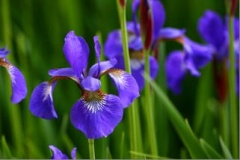Iris, Fleur-de-lis
| Infobox on Iris, Fleur-de-lis | |
|---|---|
| Example of Iris, Fleur-de-lis |  |
| Facts | |
| Origin | - |
| Stowage factor (in m3/t) | - |
| Humidity / moisture | - |
| Ventilation | - |
| Risk factors | See text |
Iris, Fleur-de-lis
Contents
Description / Shipment / Storage / Risk factors
Scientific Name and Introduction
Iris cvs., hybrids. Because of their intense yellow, blue, and purple colours, and the elegant shape of their flowers and foliage, bulbous (Dutch) Iris are in considerable demand as cut flowers. Unfortunately, they are also one of the shortest-lived of the commercial cut flowers, and may not even open if handled improperly or held too long before sale. In recent years, other iris species, e.g., the ‘flag’ or German iris, which have even shorter vase-life, have been used in the trade. Iris is Greek for ‘rainbow’ in reference to the range of flower colours.
Quality Characteristics and Criteria
Iris grown at low temperature should be harvested more open than those grown in warmer conditions. Iris flowers are normally harvested at the "pencil stage," when a line of colour projects out of the sheathing leaves. The 'Blue Ribbon' cultivar should be harvested more mature, when the edge of one petal is unfurled. Iris are pulled from the field at the correct stage of maturity. The bulb is cut off and the lower foliage removed. The flower stems are then placed in water. Wholesale and retail florists should purchase iris in the pencil stage. This term describes flowers that exhibit a line of colour vertically, as the sheathing leaves covering them unfurls, but before the flower petals reflex. A major exception is the cultivar ‘Blue Ribbon,’ which should be more open at the time of purchase.
Grading and Bunching
There are no formal grade standards for iris flowers. Flowers should be uniform in variety, colour, and maturity. Foliage should be relatively undamaged and free from disease. Stems should be strong and straight. Flowers are normally bunched in groups of 10, and the bunches are tied with rubber bands or twistems.
Ethylene Sensitivity
Iris are not affected by exposure to ethylene.
Pretreatments
There are no recommended pretreatments for iris flowers.
Storage Conditions
Store iris dry, upright, at 0ºC for no more than 1 week. Some growers store iris with the bulb attached. Prolonged storage may result in failure of flowers to open (especially the 'Blue Ribbon' cultivar). Storage at warmer temperatures will result in ‘popping’ of the flower when it is re-hydrated.
Packing
Iris are normally packed in upright hampers.
Special Considerations
Some increase in vase-life has been realized by including a high concentration of benzyladenine in the vase solution, and pretreatments with gibberellins have been shown to overcome the negative effects of dry storage.
Sources used
BMT Consolidated Manual on (Dutch) Flower Bulbs, cut flowers/greens and potted plants.











